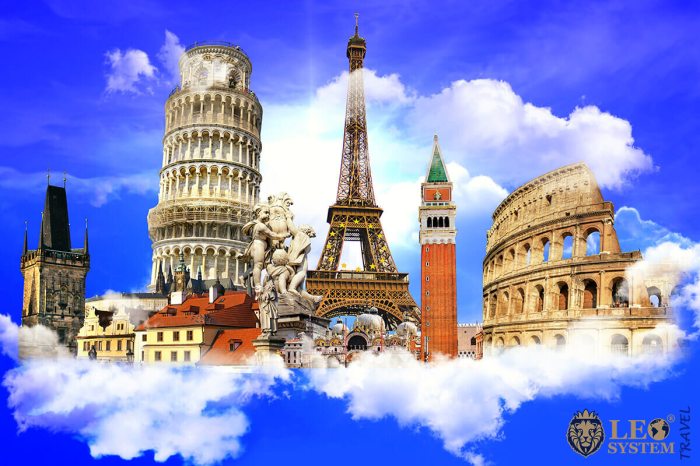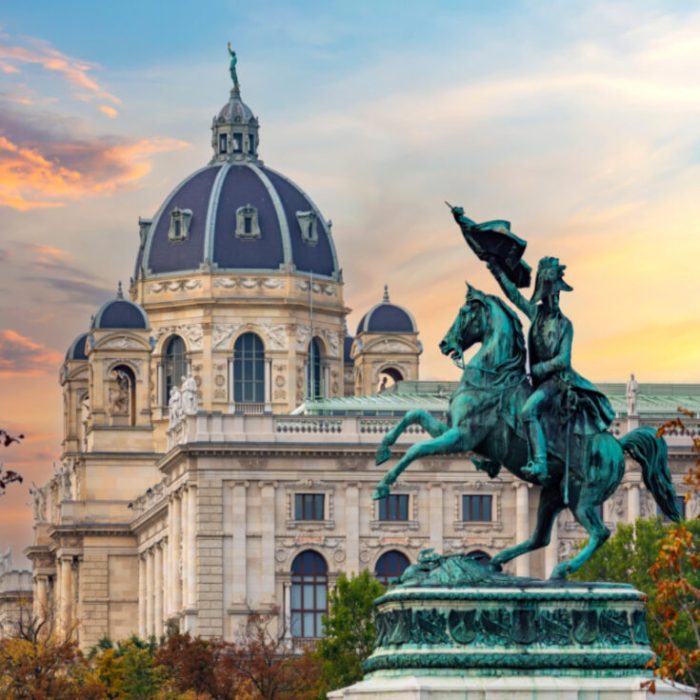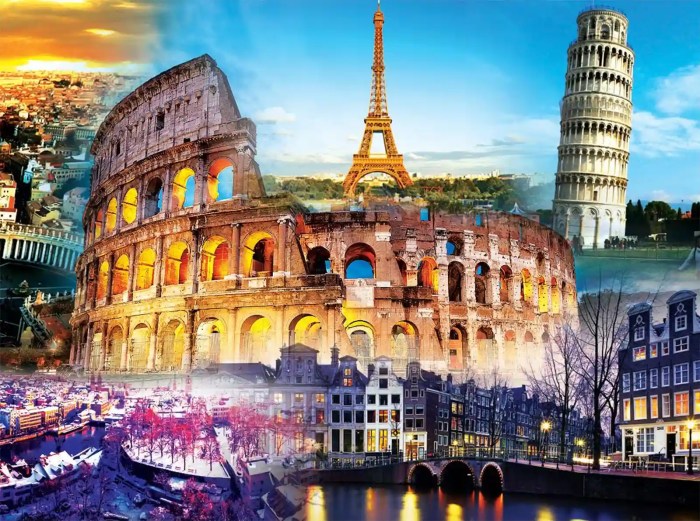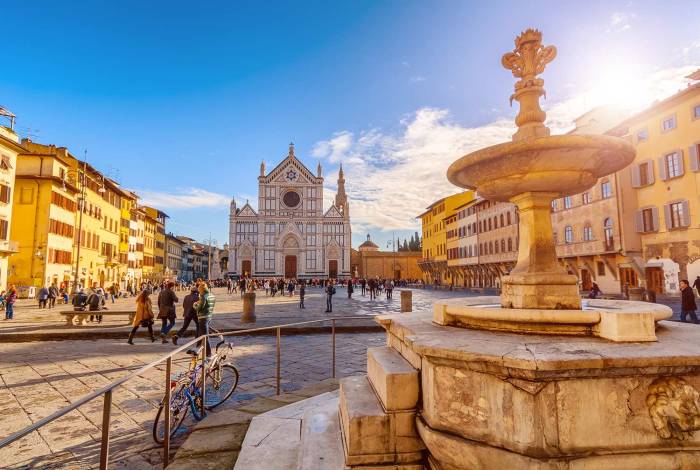Cultural tours in Europe offer an unparalleled opportunity to delve into the rich tapestry of history, art, music, and cuisine that has shaped this continent for centuries. From iconic landmarks to hidden gems, Europe is a treasure trove of cultural experiences waiting to be explored.
From the grandeur of Gothic cathedrals to the masterpieces of the Renaissance, Europe’s architectural heritage is a testament to the ingenuity and creativity of its people. Art museums and galleries house priceless collections that span from ancient artifacts to contemporary works, showcasing the evolution of artistic expression throughout history.
Cultural Heritage and Historical Significance
Europe, a continent steeped in history and rich in cultural heritage, has long been a captivating destination for cultural tours. From the ancient ruins of Greece and Rome to the grand cathedrals of the Middle Ages and the modern architectural marvels of today, Europe offers a captivating tapestry of cultural experiences.
The continent’s storied past has left an enduring legacy of iconic landmarks, monuments, and UNESCO World Heritage Sites. These include the Acropolis of Athens, the Colosseum of Rome, the Eiffel Tower of Paris, and the Sagrada Familia of Barcelona. Each of these landmarks bears witness to the ingenuity, creativity, and artistry of past civilizations.
Influence of Civilizations and Empires
Over the centuries, Europe has been shaped by the influence of various civilizations and empires, each leaving its own unique mark on the continent’s culture. From the ancient Greeks and Romans to the medieval empires of Charlemagne and the Ottomans, each civilization has contributed to the rich tapestry of European heritage.
- The Greeks laid the foundations of Western philosophy, science, and art.
- The Romans established a vast empire that spread their language, laws, and infrastructure throughout Europe.
- The medieval empires of Charlemagne and the Ottomans introduced new architectural styles, religious practices, and cultural traditions.
Art and Architecture

Europe is a melting pot of architectural styles, showcasing the artistic and cultural evolution of the continent. From the soaring Gothic cathedrals of the Middle Ages to the elegant Renaissance palaces of the 15th century, each era has left its mark on the architectural landscape.
Famous Art Museums and Galleries
Europe is home to some of the world’s most renowned art museums and galleries. The Louvre in Paris houses masterpieces like Leonardo da Vinci’s Mona Lisa and the Venus de Milo. The Uffizi Gallery in Florence boasts a collection of Italian Renaissance art, including works by Botticelli, Michelangelo, and Raphael. The Prado Museum in Madrid displays a vast collection of Spanish art, including masterpieces by Goya and El Greco.
Connection Between Art and History
Art and history are intertwined in Europe. The paintings, sculptures, and architecture of the past provide a glimpse into the social, political, and cultural context of their time. For example, the Gothic cathedrals reflect the religious fervor of the Middle Ages, while the Renaissance palaces showcase the wealth and power of the ruling elite.
Music and Performing Arts

Europe is renowned for its vibrant music scene, spanning classical, folk, and contemporary genres. Its rich musical heritage has shaped the development of Western music, producing renowned composers, musicians, and performers.
Opera Houses and Concert Halls
Europe is home to iconic opera houses and concert halls that host world-class performances. These venues showcase a diverse range of operas, ballets, and concerts, attracting audiences from around the globe.
- Vienna State Opera: One of the most prestigious opera houses, known for its opulent architecture and performances of classic operas.
- La Scala, Milan: A legendary opera house that has premiered numerous famous operas and hosted renowned singers and conductors.
- Royal Opera House, London: A leading opera house showcasing a wide repertoire, including traditional and contemporary works.
- Philharmonie de Paris: A modern concert hall renowned for its exceptional acoustics and programming featuring renowned orchestras and soloists.
Music Festivals, Cultural tours in Europe
Europe hosts numerous music festivals that celebrate different genres and attract music enthusiasts worldwide. These festivals provide platforms for emerging and established artists, fostering cultural exchange and promoting musical diversity.
- Glastonbury Festival, England: A legendary festival featuring a wide range of music, arts, and performances, attracting hundreds of thousands of attendees.
- Sziget Festival, Hungary: A vibrant festival that showcases a diverse lineup of international and local artists, attracting a global audience.
- Roskilde Festival, Denmark: A renowned festival known for its focus on rock and alternative music, featuring performances by renowned artists and emerging bands.
- Edinburgh Fringe Festival, Scotland: A multi-arts festival that includes a significant performing arts component, featuring theater, dance, comedy, and music.
Performing Arts in European Culture
Performing arts play a significant role in European culture, serving as a means of cultural expression, entertainment, and social cohesion. They reflect the region’s rich history, traditions, and contemporary influences.
Theater, dance, and circus arts have a strong presence in Europe, with many countries having their own national companies and renowned performing arts schools. These art forms contribute to the cultural identity of each country and foster a sense of community and belonging.
The performing arts industry in Europe provides employment for a significant number of artists, technicians, and support staff. It contributes to the local economy and supports cultural tourism, attracting visitors from around the world.
Cuisine and Gastronomy
Europe is a culinary paradise, boasting a diverse array of culinary traditions that have evolved over centuries. From the rich flavors of Mediterranean cuisine to the hearty dishes of Central Europe, each region offers a unique gastronomic experience.
Regional specialties abound, showcasing the influence of local ingredients and cooking techniques. Think of the succulent paella from Spain, the delicate pastries of France, or the hearty goulash of Hungary. Michelin-starred restaurants dot the continent, offering innovative and exquisite dining experiences that push the boundaries of culinary art.
If you’re seeking an enriching experience, consider cultural tours in Europe, immersing yourself in diverse histories, arts, and traditions. For those seeking an adventurous escape, the United States offers an array of best hiking trails in the US , traversing breathtaking landscapes and connecting with nature.
After invigorating hikes, return to the cultural tapestry of Europe, where ancient ruins, vibrant cities, and culinary delights await your exploration.
The Importance of Food in European Culture
Food holds a central place in European culture, deeply intertwined with history and local traditions. It is a way of life, a means of socializing, and a source of pride. Traditional recipes are passed down through generations, preserving cultural heritage and connecting people to their roots.
Festivals and Events

Europe is renowned for its vibrant cultural festivals and events, which play a pivotal role in showcasing the continent’s rich heritage, traditions, and creativity. These gatherings offer unique experiences, attract visitors from around the globe, and contribute significantly to the cultural fabric of Europe.
From traditional music festivals to contemporary art exhibitions, Europe hosts a diverse array of events that cater to various interests. These events not only provide entertainment but also serve as platforms for cultural exchange, promoting understanding and appreciation of different traditions.
Europe’s rich cultural tapestry offers a myriad of captivating tours that immerse travelers in its storied past. From exploring the ancient ruins of Greece to marveling at the Renaissance masterpieces in Italy, there’s a tour to suit every interest. And for those seeking an aquatic adventure, Europe also boasts some of the world’s most renowned scuba diving locations , offering opportunities to explore vibrant marine ecosystems and encounter marine life up close.
After exploring the depths of the ocean, one can return to the cultural riches of Europe, continuing their journey through time and tradition.
Music Festivals, Cultural tours in Europe
- Glastonbury Festival (UK): One of the world’s largest and most iconic music festivals, featuring a diverse lineup of artists across multiple stages.
- Roskilde Festival (Denmark): A renowned music festival known for its eclectic lineup, showcasing both established and emerging artists.
- Exit Festival (Serbia): A major electronic music festival held in a historic fortress, featuring international DJs and a vibrant party atmosphere.
- Primavera Sound Festival (Spain): A renowned music festival that showcases alternative and indie music, attracting music enthusiasts from around the world.
Art Exhibitions
- Venice Biennale (Italy): A prestigious international art exhibition that showcases contemporary art from around the globe.
- Documenta (Germany): A major contemporary art exhibition held every five years in Kassel, featuring works by leading artists.
- Art Basel (Switzerland): One of the world’s leading art fairs, attracting collectors, dealers, and art enthusiasts.
- Frieze Art Fair (UK): A renowned art fair that showcases modern and contemporary art from leading galleries.
Cultural Festivals
- Oktoberfest (Germany): A world-famous beer festival held in Munich, featuring traditional Bavarian music, food, and costumes.
- Edinburgh Fringe Festival (UK): The world’s largest arts festival, showcasing a diverse range of performances, from theater to comedy.
- Carnaval de Nice (France): A colorful and extravagant carnival held in Nice, featuring parades, music, and street performances.
- Palio di Siena (Italy): A historic horse race held twice a year in Siena, showcasing medieval traditions and rivalries.
Cultural Immersion and Local Experiences

Embracing the local culture during a cultural tour is paramount to unlocking an authentic and enriching travel experience. It allows travelers to transcend mere sightseeing and delve into the very essence of European society.
Immersion can be achieved through various activities that foster connections with locals. These include visiting vibrant markets, where travelers can engage with vendors and witness traditional bargaining customs. Attending workshops provides hands-on experiences, enabling travelers to learn local crafts and techniques firsthand.
Participating in Traditional Customs
Participating in traditional customs offers a profound insight into the cultural fabric of a region. Whether it’s donning traditional attire for a festival or joining a community dance, these experiences bridge the gap between tourists and locals, creating a sense of shared camaraderie.
By immersing themselves in local culture, travelers gain a deeper understanding of European history, traditions, and values. It fosters a sense of respect and appreciation for the diversity and richness of European heritage.
Responsible Tourism and Sustainability: Cultural Tours In Europe
Cultural tourism can have a profound impact on European destinations, both positive and negative. On the one hand, it can generate economic benefits for local communities, support the preservation of cultural heritage, and promote cross-cultural understanding. On the other hand, it can also lead to overcrowding, environmental degradation, and the commodification of local cultures.
Cultural tours in Europe offer an enriching experience for families, immersing them in the continent’s rich history, art, and architecture. These tours provide a unique opportunity for children to learn about different cultures and broaden their perspectives. However, when planning a family vacation, it’s essential to consider destinations that cater to all ages and interests.
To discover the best family vacation spots, explore our comprehensive guide here. While cultural tours in Europe remain a fantastic choice, our guide offers a wider range of options to ensure an unforgettable and enjoyable vacation for the entire family.
To ensure that cultural tourism is sustainable, it is important to adopt responsible practices that respect local customs, preserve heritage sites, and support local businesses. This includes:
- Visiting during off-peak seasons to avoid overcrowding.
- Respecting local customs and traditions.
- Choosing tour operators that are committed to sustainability.
- Supporting local businesses by eating at local restaurants, staying in local guesthouses, and buying souvenirs from local artisans.
- Minimizing your environmental impact by walking, cycling, or taking public transportation.
There are a number of sustainable cultural tourism initiatives that are being implemented in Europe. For example, the European Union has launched the “Sustainable Tourism for All” initiative, which aims to promote responsible tourism practices and support sustainable tourism businesses. In addition, many cities and regions have adopted their own sustainable tourism plans. For example, the city of Barcelona has implemented a number of measures to reduce overcrowding, including limiting the number of tourists who can visit the city’s most popular attractions and promoting alternative destinations.
These initiatives are having a positive impact on European communities and the environment. For example, a study by the World Tourism Organization found that sustainable tourism can help to reduce poverty, improve education levels, and protect the environment. In addition, sustainable tourism can help to preserve cultural heritage and promote cross-cultural understanding.
Final Review

Whether you seek to immerse yourself in the vibrant music scene, savor the delights of regional cuisines, or witness the grandeur of cultural festivals, Europe offers an unforgettable journey that will enrich your mind, broaden your horizons, and create lasting memories.
FAQ Resource
What is the best time to visit Europe for cultural tours?
Spring and fall offer ideal weather conditions and fewer crowds, making them excellent times to experience Europe’s cultural offerings.
How can I immerse myself in local culture during a cultural tour?
Attend local markets, participate in workshops, and engage with the people you meet. These interactions will provide a deeper understanding of the region’s customs and traditions.
What are some responsible tourism practices to follow during a cultural tour?
Respect local customs, preserve heritage sites, support local businesses, and minimize your environmental impact.